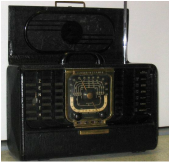Our family attended Vassar Temple – so named, with the assimilative fervor of its Reformed Jewish founders, after its location on Vassar Street. In the same assimilative mood, its weekly religious instruction for children was called Sunday School.
A Sunday School teacher or the rabbi surely must have passed on to us, as a matter of interest, if not as an element of faith, the literal meaning of the words of the sprightly hymn, Ein Kelohainu. But unlike the happy picture-book animal world that could be discovered in the cubist text of Mairzy Dotes, the revealed mysteries of Ein Kelohainu had no connection to the world I knew or wished for and – to use a favorite phrase of exasperation of my mother’s – went in one ear and out the other.
What Ein Kelohainu lacked in interest and wit compared with Mairzy Dotes, it gained in conviviality. The exuberance allowed – encouraged, in fact – in belting it out was a relatively exciting experience in the diurnal round of middle-class Jewish eight-year-olds in Poughkeepsie in the post-war Forties. Not only did hallooing Ein Kelohainu erase, momentarily, the wary anxiety I usually felt among a group of peers I did not know all that well (my friends’ parents all were Conservative Jews, and thus were members of Temple Beth- El) but, because its language was so peculiar, it was like going crazy in costume.
There was a catch, though. The lunacy broke down and reality glared through when we reached one particular phrase: ch’moshienu. These six syllables marred the mindlessness and gleefulness of the Ein Kelohainu experience because in them I heard the word “commotion.”
“Commotion” was another of my mother’s expressions of exasperation. She was aware that a certain degree of high spirits was a sign of pediatric mental health – an ongoing concern of hers, beset, as she was, with two seemingly deliberately moody children. She used “commotion” to describe a level of physical activity and/or vocalization that was not enough to be forbidden, but was enough to get on her nerves. “That’s enough commotion for now!” she would cry – or something to that effect.
It was so typical of life – even then I knew it – that in the midst of a warbling Dionysian fellowship a twinge of self-consciousness was sure to intrude.
A Sunday School teacher or the rabbi surely must have passed on to us, as a matter of interest, if not as an element of faith, the literal meaning of the words of the sprightly hymn, Ein Kelohainu. But unlike the happy picture-book animal world that could be discovered in the cubist text of Mairzy Dotes, the revealed mysteries of Ein Kelohainu had no connection to the world I knew or wished for and – to use a favorite phrase of exasperation of my mother’s – went in one ear and out the other.
What Ein Kelohainu lacked in interest and wit compared with Mairzy Dotes, it gained in conviviality. The exuberance allowed – encouraged, in fact – in belting it out was a relatively exciting experience in the diurnal round of middle-class Jewish eight-year-olds in Poughkeepsie in the post-war Forties. Not only did hallooing Ein Kelohainu erase, momentarily, the wary anxiety I usually felt among a group of peers I did not know all that well (my friends’ parents all were Conservative Jews, and thus were members of Temple Beth- El) but, because its language was so peculiar, it was like going crazy in costume.
There was a catch, though. The lunacy broke down and reality glared through when we reached one particular phrase: ch’moshienu. These six syllables marred the mindlessness and gleefulness of the Ein Kelohainu experience because in them I heard the word “commotion.”
“Commotion” was another of my mother’s expressions of exasperation. She was aware that a certain degree of high spirits was a sign of pediatric mental health – an ongoing concern of hers, beset, as she was, with two seemingly deliberately moody children. She used “commotion” to describe a level of physical activity and/or vocalization that was not enough to be forbidden, but was enough to get on her nerves. “That’s enough commotion for now!” she would cry – or something to that effect.
It was so typical of life – even then I knew it – that in the midst of a warbling Dionysian fellowship a twinge of self-consciousness was sure to intrude.

 RSS Feed
RSS Feed